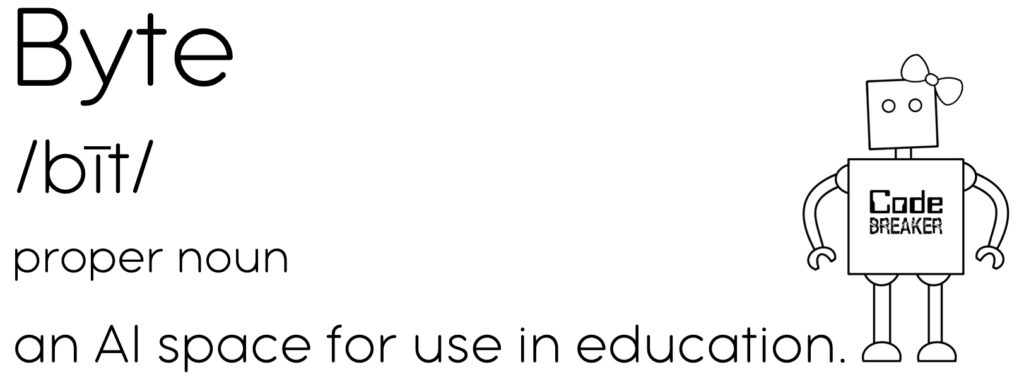
How will artificial intelligence disrupt teaching and learning in schools?
ChatGPT has increased conversations about artificial intelligence. ChatGPT is a trained chatbot processing tool driven by AI technology that can provide a thorough human-like response to questions or instructions. First released to the public in November of 2022, ChatGPT continues to be a hot topic among educators who passionately investigate, discuss, and dispute positives and negatives associated with this emerging technology.
AI could be interpreted as complex, dangerous, miraculous, and/or exciting. With that being said, AI and automation will drastically change processes, expectations, education, life, and human job opportunities. Jobs such as telemarketers, tax preparers, insurance underwriters, legal secretaries, loan officers, and credit analysts have a much higher probability of automation drastically impacting their jobs compared to those in education. However, educators can disrupt by amplifying the impact that artificial intelligence has while teaching and learning.
Demands for AI will increase as benefits are realized. We need to appreciate evolving needs and opportunities to understand technology changes for both ourselves and our students. Educators should also discuss criteria for when students or staff could use AI as well as criteria for when and how they should not use AI. We must also investigate how or when AI can help make better decisions based on recommendations from data; simplify information; enhance productivity, efficiency, and impact; understand complex tasks; or carry out complex commands.
How will you empower educators and students at a time where the usage, speed, strength, and impact of AI are greater than ever before; while simultaneously and ironically also being the least used, slowest, weakest, and least impactful it will ever be? Rather than focusing on the challenges and ambiguity associated with teaching and learning with AI, appreciate the benefits and maximize the opportunities.
Educators (and people in general) continue to learn more about AI which rapidly evolves daily. This independent and collaborative learning can be enhanced with specific skills. The guiding words for artificial intelligence skills can be framed around the acronym A.R.T.I.F.I.C.I.A.L. The resulting guiding words are adaptability, resilience, teamwork, inquisitiveness, focus, improvement, communication, interpretation, application, and learning.
Adaptability: Recognize, embrace, and celebrate reasons and opportunities to change mindset, thinking, expectations, plans, strategies, communication, and commitment. Creatively demonstrate cognitive flexibility by making modifications, pivoting, or tinkering with iterations. Tweaks can happen earlier or later in the process, by focusing on inputs or results.
Resilience: Courageously understand and control emotions, effort, and problem-solving while resourcefully learning from mistakes, challenges, and ambiguity with a growth mindset. Focus on what you can control such as your thinking, actions, reactions, energy, attitude, and enthusiasm when not successful YET. Manage stress, brainstorm solutions, and build momentum while not taking criticism personally. Appreciate growth and progress to inspire persistence through challenges and mistakes.
Teamwork: Collaborate by empathetically understanding and respecting others while adding value to common goals by focusing on interpersonal relationship-building skills. Enhance collaboration by focusing on belonging, connections, integrity, organization, and open mindedness to different perspectives and ideas.
Inquisitiveness: Curiously imagine, investigate, brainstorm, invent, create, dream, and question. Construct your own meaning by engaging in reflection and active questioning. Wonder why while evaluating what could change, increase, or decrease. Know where and how to find information as well as how and when to ask for help.
Focus: Focus on impactful variables, timing, and reasons. Reduce distractions and multi-tasking, focus on the moment, and take breaks. Focus independently and collaboratively to identify values, goals, and growth indicators that can be shared and celebrated.
Improvement: Ethically and proudly enhance short- and long-term effectiveness, efficiency, and quality based on feedback and reflection. Appreciate the journey, conversations, incremental progress, and small wins, not just the goal or perceived destination.
Communication: Clearly, thoughtfully, and accurately exchange information with computers and humans via effective word choice. Communication could be written, verbal, or non-verbal and could serve different purposes such as persuading, presenting, negotiating, networking, or teaching. Enhance impact with appropriate body language, tone of voice; listening (or reading) to understand; and aligning with shared goals, purposes, or visions.
Interpretation: Seek to understand ambiguity, nuances, and opportunities with logical, efficient, and resourceful reasoning, analysis, and critical thinking. Leverage statistics, probability, and mathematics skills to categorize, classify, apply, process, predict, adapt, analyze, and explain algorithms, systems, graphs, applications, structures, and models. Reason by logically and creatively problem-solving to break into smaller problems, steps, and goals. Calculate risks, challenges, implications and impacts to determine causes and effects to maximize productivity and success.
Application: Enhance the understanding and impact of concepts, skills, and topics by building on prior experiences and making connections. Application can move beyond the classroom, schools, and school districts with reflection before, during, and after activities.
Learning: Develop a deeper understanding through learning, feedback, practicing, and training. Seek, share, and learn from feedback while learning, unlearning, and teaching others.
When we appreciate the strengths and possibilities of AI, we can amplify possibilities by maximizing educator use of artificial intelligence to help students learn, grow, and lead in an evolving world. We must recognize and embrace the ambiguity and challenges associated with AI while ultimately enhancing the impact and effectiveness of teaching and learning.
The acronym A.R.T.I.F.I.C.I.A.L. empowers educators and learners to disrupt by leveraging these artificial intelligence skills by adapting resiliently with teamwork while being inquisitive and staying focused on improvement as we communicate interpretations and applications to learn, teach, and lead.
What different ways can we enhance the power of artificial intelligence?
ABOUT THE AUTHOR

Dr. Erik Youngman is an education leader who is passionate about topics such as homework, growth mindset, grading, and leadership. His first book, 12 Characteristics of Deliberate Homework, defines what deliberate homework looks like and provides relevant, actionable suggestions to guide homework decisions. Erik has also written numerous blogs about growth mindset. His latest project is a children’s book about growth mindset, The Magic of Growth Mindset, focused on maximizing the power of yet.
